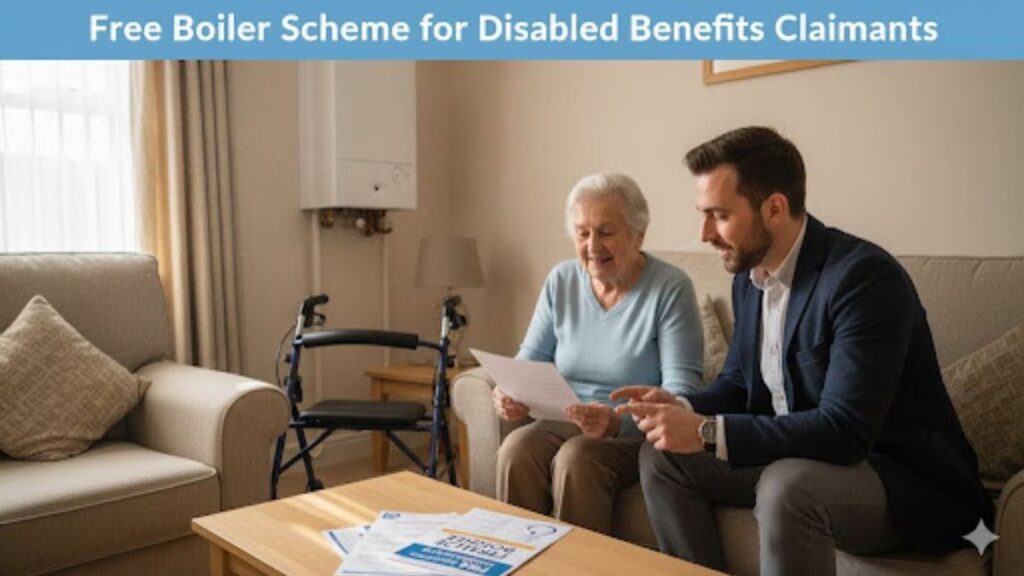Unfortunately, most of the disabled households are burning money on inefficient boilers unknowingly. They pay approximately £1,010 extra per month just to maintain basic living standards. That’s the premium disability costs you, according to recent data. Thankfully, programs like the Free Boiler Scheme may offer a lifeline. Additionally, 55% of working-age disabled adults can’t pay their energy bills.
But unfortunately, most people don’t know that the government will replace your ancient boiler for free, including the installation and labour costs.
What Is ECO4 and Why Should You Care?
ECO4 (Energy Company Obligation) forces major energy suppliers to fund heating upgrades. British Gas, EDF, E.ON, Scottish Power, they all pay for this. These measures are not optional for them; they’re mandatory.
The scheme targets two main problems for households: fuel poverty and carbon emissions. And your old boiler? It’s wasting 30% of the energy it burns. Luckily, new A-rated condensing boilers cut that waste dramatically.
Here’s what you get: full boiler removal, new energy-efficient installation, pipework upgrades, and controls setup. Qualified engineers handle everything. You pay nothing.
Who Qualifies? There are Two Routes With Different Rules
Usually, the local councils might consider you eligible through multiple routes. As most of the installers won’t explain this clearly, you should pay attention as we do.
Route 1: Income-Related Benefits
If you receive any of these benefits, you’re automatically in:
| Qualifying Benefit | Eligibility Status |
| Universal Credit | ✓ Qualifies |
| Income-related ESA | ✓ Qualifies |
| Income Support | ✓ Qualifies |
| Income-based JSA | ✓ Qualifies |
| Pension Credit (Guarantee) | ✓ Qualifies |
| Housing Benefit | ✓ Qualifies |
| Child Tax Credit | ✓ Qualifies |
| Working Tax Credit | ✓ Qualifies |
| PIP (alone) | ✗ No longer qualifies |
| DLA (alone) | ✗ No longer qualifies |
| Attendance Allowance (alone) | ✗ No longer qualifies |
Important Note: PIP, DLA, and Attendance Allowance no longer qualify independently. That cut out 200,000 households overnight. However, if you receive PIP plus Universal Credit, you’re still eligible through UC.
Your home must also meet these criteria:
- The boiler must be over 7 years old
- You should own your home or private tenant (not council housing)
- EPC rating must be E, F, or G
Route 2: ECO4 Flex (The Backdoor Entry)
If you don’t qualify through benefits, you can try the alternative ways; believe me, it’s totally worth it.
Usually, the local councils identify vulnerable households using flexible criteria:
- Annual household income below £31,000.
- EPC rating E–G.
- Disability or long-term health condition worsened by cold/damp.
- Council nomination as vulnerable.
Do you think you’re stuck because you don’t claim benefits? Well, you’re wrong. If your income is low and cold affects your health, you can contact your council’s fuel poverty officer, who can nominate you as vulnerable to cold weather, and you can still qualify.
Does Your Health Condition Strengthen Your Case?
Certain conditions make councils more likely to support you under Flex:
- Respiratory conditions (asthma, COPD)
- Cardiovascular disease
- Severe arthritis or mobility disabilities
- Mental health conditions worsen in cold homes
Get documentation from your GP or specialist. It helps.
How to Apply: The Five-Step Process
Most guides overcomplicate this. It’s straightforward if you know the sequence.
Step 1: Verify Eligibility
Check your benefits against the qualifying list. Know your boiler’s age (check the manual or ask your current engineer). Complete an online eligibility checker; it takes three minutes.
Step 2: Gather Documents
You need:
- Benefit award letters
- Photo ID (passport or driving licence)
- Proof of address (utility bill, council tax statement)
- EPC certificate
- Medical evidence (if applying through Flex)
Step 3: Contact an Approved Installer
Never apply through energy suppliers directly. They’ll redirect you anyway. Use the Better Housing Better Health website to find accredited installers in your area. Or ask your local council for recommendations.
The installer verifies eligibility and books a free survey.
Step 4: Survey Visit (2–4 Weeks)
A surveyor assesses your boiler, heating system, and property condition. They verify your documents and confirm eligibility.
Step 5: Installation (1–2 Weeks After Approval)
Engineers book a slot and install your new boiler in 4–8 hours. They remove the old unit, fit the new one, test everything, and provide warranty documentation.
What You Actually Save (The Numbers)
Let’s talk real savings, not vague promises.
| Benefit | Impact |
| Annual heating cost reduction | £150–£300/year |
| Lifetime savings (10–15 years) | £2,000–£4,500 |
| Upfront cost avoided | £2,500–£4,000 |
| Carbon emissions cut | 20–30% reduction |
- Financial impact: A 20–30% reduction in heating costs isn’t trivial for a fixed-income household. That’s groceries. Medication. Essentials.
- Health impact: Consistent heating reduces respiratory infections, arthritis flare-ups, and cardiovascular strain. Fewer hospital visits. Less medication use.
- Reliability: New boilers break down far less. Manufacturer warranties cover 5–10 years. No emergency repair costs at 2 a.m. in January.
Common Barriers (And How to Bypass Them)
“I Only Receive PIP, Am I Excluded?”
Yes, under standard ECO4. But ECO4 Flex remains available. Contact your council immediately. If your income is below £31,000 and your disability affects your housing needs, you may qualify.
“My Boiler Still Works, Does Age Matter?”
The 7-year threshold exists for a reason. Efficiency drops sharply after year seven. But if your boiler breaks down frequently or an engineer declares it beyond economical repair, emergency provisions apply through LEAP (Low Income Energy Advice Partnership).
“I’m a Private Tenant, Can I Apply?”
Absolutely. But you need written landlord permission before installation. Most landlords agree, it raises property value and eliminates their maintenance liability. Include the permission letter with your application.
“I Don’t Claim Benefits, Am I Shut Out?”
No. ECO4 Flex exists for this scenario. Call your council’s energy efficiency department. Explain your income and health vulnerabilities. They may nominate you.
Alternative Schemes (If ECO4 Doesn’t Fit)
ECO4 isn’t the only game. Three backup options exist.
LEAP Boiler Scheme: Emergency repairs and replacements for broken boilers. Eligibility requires household members aged 65+, under school age, or with significant health conditions. Referrals through partner organisations only.
Boiler Upgrade Scheme: Grants for low-carbon systems (heat pumps, biomass). £5,000–£7,500 available. Requires property ownership. No benefit eligibility needed. But these are grants toward cost, not free installations.
Local Council Schemes: Many councils run independent energy efficiency programmes. Contact your housing or environmental department. Ask about grants, low-interest loans, or supplier partnerships.
The Bottom Line
You now know more than 90% of eligible households. If you are seeking support, look into Free Boiler Grants. First, verify eligibility through benefits or Flex criteria. Second, gather your documents. Third, contact an approved installer. If standard ECO4 doesn’t apply, explore LEAP or council schemes.
The process is free and non-binding. Given the financial and health benefits, £2,000+ lifetime savings, consistent warmth, reduced breakdowns, delaying makes zero sense.







